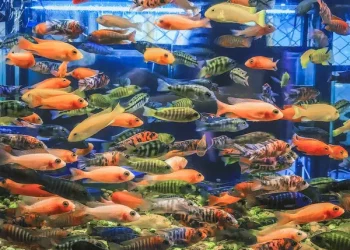Lungfish are a type of fish that have a unique ability to breathe air. Unlike most fish, which rely on their gills to extract oxygen from water, lungfish have a primitive lung that allows them to breathe air. But do lungfish have true lungs, like those found in mammals and reptiles?
The answer is both yes and no. Lungfish do have a lung, but it is not the same as the lungs found in mammals and reptiles. Instead, their lung is more similar to the swim bladder found in other fish. The swim bladder is an organ that helps fish control their buoyancy, allowing them to maintain their position in the water column. In lungfish, the swim bladder has evolved into a primitive lung.
The lung of a lungfish is divided into two lobes, and is lined with blood vessels that allow for gas exchange. When the lungfish needs to breathe air, it will come to the surface and gulp air into its lung. The oxygen from the air is then absorbed into the bloodstream, and carbon dioxide is released into the lung to be expelled when the fish exhales.
While the lung of a lungfish is not a true lung, it is a highly specialized organ that has evolved to allow the fish to survive in oxygen-poor environments. Lungfish are able to use their lung to supplement the oxygen they get from their gills, which allows them to survive in stagnant or low-oxygen environments.
In addition to their lung, lungfish have a number of other unique adaptations that allow them to survive in harsh environments. They are able to aestivate, or enter a state of suspended animation, during times of drought or other environmental stress. This allows them to survive for long periods of time without access to water.
In conclusion, lungfish do not have true lungs like those found in mammals and reptiles. Instead, they have a primitive lung that has evolved from the swim bladder found in other fish. This highly specialized organ allows lungfish to breathe air and survive in oxygen-poor environments. Lungfish are fascinating creatures with a number of unique adaptations that make them well-suited for their environment.

























